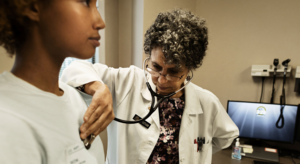[youtube]http://www.youtube.com/watch?v=qubn6KMKVjw&feature=related[/youtube]
I must admit I was quite amazed by the end of this short video clip. I was smiling from the inside out.
The stoic, often self-isolating professional culture of medicine needs to change and Dr. Patricia Lindholm is making it her mission to help lead the way.
In her inaugural address to the Minnesota Medical Association, (see video clip above) Dr. Lindholm states her intention to make physician health a priority:
“I think we need to intervene. I think we need to be there for each other. We need to be there for our colleagues. We need to care.”
In heartfelt words, she goes even further in what she asks of physicians:
“I want to add an extension to the old proverb, ‘Physician Heal Thyself”… “
“Physician Love Thyself.”
“Physician Love Thy Colleague.”
In all my years of training I don’t recall being told to, “love thyself” or “love thy colleague.” Hearing these simple words took my breath away. I am aware of too much unnecessary suffering in the lives of physicians, and this public commitment to a new direction gave me hope for the future.
In sharp contrast this more compassionate and progressive approach, a vignette from, Struggling in Silence, comes to mind. In this award-winning documentary on physician depression and suicide, Dr. Robert Lehmberg recounts a pivotal experience during medical school: “I didn’t do very well on my first anatomy exam, so I went to talk to my professor and he said (in a gruff voice), ‘Son, you are depressed. You better get over it if you want to be a doc’.”
Lehmberg discovered in his third year of medical school that when he worked harder, he had less time to be depressed. Later in his practice as a plastic surgeon, he worked even harder trying to escape the depression.
“I had 2 surgery schedules a day. I ended at 9 pm at night. I didn’t have a life. I was driven. I was very successful. You can justify it saying you are helping patients. I probably knew I needed treatment for years (but avoided getting help) primarily because of the stigma. Physicians are afraid of doing anything that will potentially jeopardize their careers.”
It was not until years later when he had a life-threatening experience that he says he woke up to his situation. He started getting treatment for depression, but was concerned about his patients and people in his community knowing about his depression. He worried about losing his referral base and his reputation.
Ultimately he found out that getting treatment for depression didn’t adversely affect his practice at all. He says he is now more sensitive to his patients and talks more openly with them. “If I had been treated earlier, my whole life would have been different. Such a waste. Such a waste. So many others suffered with me. “
How do we work to change the prevailing culture of medicine that challenges our ability to be loving towards ourselves and our colleagues? Fortunately progress is occurring, as shown by Dr. Lindholm’s willingness to make physician wellness a priority and by wellness programs springing up in various setting. And each of us can make a difference.
No, we don’t have to become “touchy-feely” or start having group therapy sessions in the doctors’ lounge.
But we can pay more attention to our colleagues and be alert to signs of distress. We can offer a listening ear or a helping hand. We can be willing to see where we might need some support or change in our status quo.
We don’t have to wait for a crisis to happen.
Latest Posts
Find what you're looking for:
Popular Categories:
Career Change | Career Enhancement | Job Search | Personal Development






















